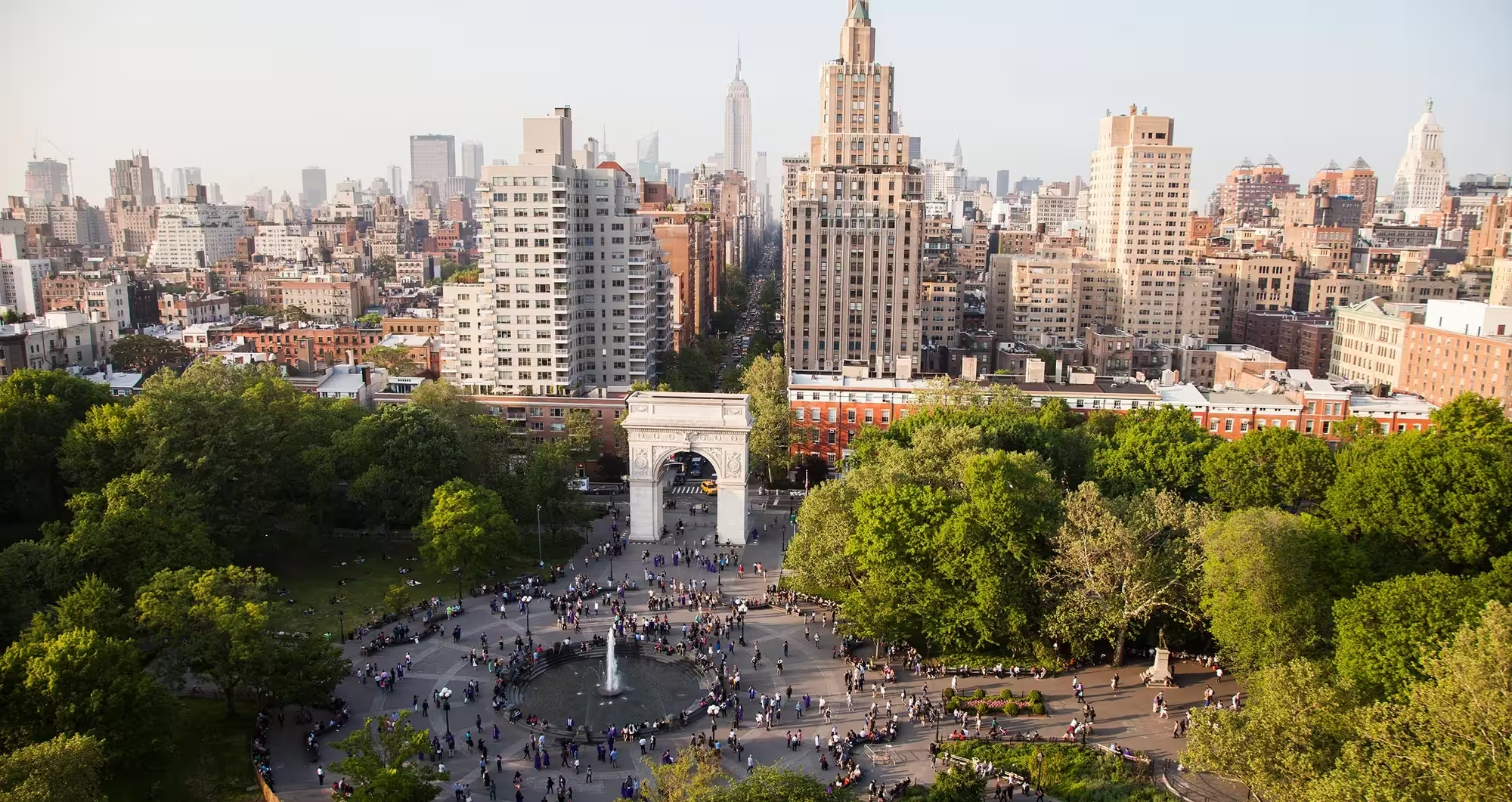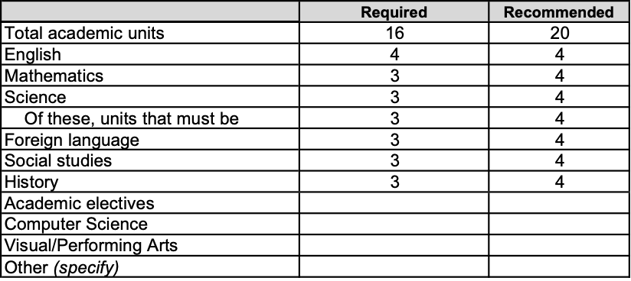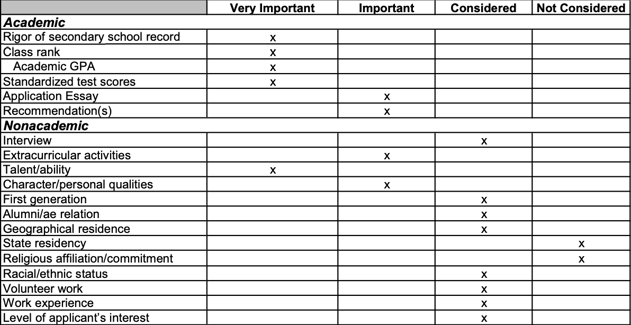New York University Admissions Profile

Introduction
Welcome to our comprehensive guide on the New York University (NYU) admissions profile. If you're considering applying to New York University, this article will provide you with all the essential information you need to know. From admission requirements to the application process, scholarships, and campus life, we've got you covered. Let's dive in and explore what makes NYU such a prestigious institution.
New York University Admissions Profile
New York University is a renowned private research university located in the heart of New York City. Established in 1831, NYU offers a diverse and dynamic educational experience with its global campuses and extensive academic programs. With a vibrant cultural scene and a bustling urban environment, NYU provides students with unparalleled opportunities for personal and professional growth.
Admissions Requirements
To gain admission to New York University, applicants must meet certain requirements. Here are the key factors considered during the admissions process:
-
Academic Excellence: NYU seeks students who have demonstrated strong academic performance. This includes a challenging high school curriculum, high grades, and competitive standardized test scores (SAT or ACT).
-
Transcripts and Coursework: Admissions officers review applicants' high school transcripts to assess their course selection, performance, and academic rigor. Taking advanced courses, such as Advanced Placement (AP) or International Baccalaureate (IB), can enhance your application.
-
Standardized Test Scores: While NYU takes a holistic approach to admissions, strong SAT or ACT scores can enhance your application. It's recommended that applicants aim for scores within or above the middle 50% range of admitted students.
-
Personal Statement: NYU requires applicants to submit a personal statement that showcases their unique experiences, aspirations, and motivations. Use this opportunity to demonstrate your passion, intellectual curiosity, and alignment with NYU's values.
Below are tables highlighting how NYU evaluates each applicant through information published in the Common Data Set, a resource that compiles a standardized list of data items provided by universities about their admissions profiles.
Distribution of high school units required and/or recommended

Relative importance of each of the following academic and nonacademic factors in your first-time, first-year, degree-seeking general (not including programs with specific criteria) admissions decisions.

SAT and ACT Policies


The Application Process
Applying to New York University involves several steps, and it's important to stay organized throughout the process. Let's walk through each stage of the application process:
1. Common Application or NYU Application
NYU accepts both the Common Application and the NYU Application. Choose the application platform that you are most comfortable with and complete the application form accurately, including personal information, academic history, and extracurricular involvement.
2. Supplemental Essays
As part of the application process, New York University (NYU) requires applicants to complete supplemental essays. These essays provide an opportunity for applicants to showcase their unique qualities, experiences, and aspirations beyond what is captured in their general application. Let's explore the supplemental essays required by NYU:
Essay Prompt 1: Why NYU? (400 words maximum)
This prompt asks applicants to articulate their reasons for choosing NYU specifically. Applicants should convey their genuine interest in NYU and explain why the university is an ideal fit for their academic and personal goals. It's important to conduct thorough research on NYU's programs, campus culture, and resources to create a tailored response that highlights the applicant's enthusiasm for becoming a part of the NYU community.
Essay Prompt 2: Choose one of the following prompts (200-250 words maximum):
a) New York City is a global hub that allows students to interact with people from all over the world. If you had the opportunity to have a 30-minute conversation with any person in human history (either living or deceased), who would be the person you choose? Why?
b) NYU's global network provides an abundance of opportunities for students to engage in impactful experiences. Describe an experience you have had living or studying in a different country. What did you learn from that experience and how might it influence your time at NYU?
c) Our students are involved in clubs, organizations, and community service work that enhances their personal and academic lives. Describe an activity, interest, or organization that you have been involved in and how it has contributed to your personal growth.
These prompts offer applicants a chance to share their personal experiences, interests, and perspectives. Applicants should choose the prompt that resonates with them the most and provide a well-crafted response that demonstrates self-reflection, critical thinking, and the ability to articulate ideas effectively.
Essay Prompt 3 (Optional): Is there anything else you would like to tell us that you have not had the opportunity to describe elsewhere in the application? You may include any majors or areas of study you're currently considering. (200-400 words maximum)
This optional prompt gives applicants the opportunity to share any additional information they believe is important for the admissions committee to know. It could be an explanation of extenuating circumstances, unique achievements, or interests not captured elsewhere in the application. Applicants should use this essay wisely to supplement their application and provide valuable insights into their background or accomplishments.
Applicants should approach these supplemental essays with authenticity, clarity, and thoughtfulness. It is important to utilize the word limit effectively and provide specific examples that highlight the applicant's unique experiences, perspectives, and fit with NYU's vibrant and diverse community. By doing so, applicants can strengthen their application and demonstrate their potential contributions to the academic and social environment at New York University.
Sample Essays
NYU has slightly changed their essay topics from prior years. That being said, the following sample essays provide a good image of what NYU looks for in an applicant.
Prompt: Some students have a background, identity, interest, or talent that is so meaningful they believe their application would be incomplete without it. If this sounds like you, then please share your story.
Answer:
In her cramped kitchen, Titi Nana cracked the egg in the center of the pan, the cheeriness of the bright yellow yolk contrasting the harshness of the caldero. In a flourish, she jerked the bottle of alcohol in her hand, flames erupting from the griddle. She instructed me: "Wipe it all off," gesturing to dust off my shoulders and arms into the inferno. I laughed nervously as I removed the maldad [evil] from my body, one brush at a time.
I left Titi's apartment that day confused about how our family's practice of Santería [witchcraft] fit in with my outward embrace of my heritage. I felt as if the parts of my Latina identity I claimed openly -- dancing salsa to Celia Cruz or enjoying lechón y arroz con habichuelas en Navidad -- were contradicted by my skepticism towards Titi's rituals. My experience with Santería wasn't new, as proven by my mother's kitchen altar lit dimly by prayer candles and adorned with evil eyes, statues of San Miguel, and offerings to Elegua; however, I'd never before witnessed such a tangible demonstration of my family's ritualistic beliefs. Although it surrounded me, I refused to believe in the effects of Santería... so I shunned it entirely.
Moving to a predominantly white boarding school and away from the rituals my family had passed down, I avoided addressing the distance I had wedged between myself and my background. I pushed away all things Latina as my fear of failing to honor my Puerto Rican heritage intensified. This distance only grew as my classmates jokingly commented on my inability to speak Spanish and my whitepassing complexion, further tearing away bits of my Latinidad with each snide remark.
In an effort to build myself back up, I began to practice the small bits of Santería that I comprehended: lighting candles for good luck, placing a chalice of water by my bedside to absorb all maldad, and saying my prayers to San Miguel and my guardian angels each day. To my disbelief, the comments that attacked my Latinidad, or lack thereof, faded along with the aching feeling that I had failed to represent my heritage. As I embraced the rituals that I initially renounced, I finally realized the power in Titi's practices. In all of her cleansing and prayer rituals, she was protecting me and our family, opening the doors for us to achieve our goals and overcome the negativity that once held us back. In realizing the potential of Santería, I shifted my practices to actively protecting myself and others against adversity and employed Santería as a solution for the injustice I witnessed in my community.
Santería once served as my scapegoat; I blamed the discomfort I felt towards black magic for the imposter syndrome festering inside me. Until I embraced Santería, it only served as a reminder that I wasn't Latina enough in the eyes of my peers. Now, I understand that while intangible, ethereal, even, the magic of Santería is real; it's the strength of my belief in myself, in my culture, and in my commitment to protect others.
Prompt: Describe a problem you've solved or a problem you'd like to solve. It can be an intellectual challenge, a research query, an ethical dilemma-anything that is of personal importance, no matter the scale. Explain its significance to you and what steps you took or could be taken to identify a solution.
Answer:
They talked about the past, but never the present. In my suburban schools, they talked about Martin Luther King Jr., and Harriet Tubman, and Rosa Parks, but for some reason, not Malik el-Shabazz. I use his chosen name because that's probably what he would've wanted and because Malcolm X was mentioned in passing. My ancestors had their own struggles with white people, but no generational impact that holds a light to American slavery. My parents come from a land I only know by name and the stories they tell, and whatever I can gather from Google Maps. While I am African, I mentally distanced myself from true African-Americans; I did not deserve pity for the unspeakable horrors, nor praise for their strength and hope in face of them. In my school, there were barely ever any black kids in my class, and no true African-Americans, so I was the sole focus during lessons on Blackness, where they'd look at me, or avoid eye contact. It wasn't until I transferred to an inner-city high school that I saw the truth. It wasn't until I went from the blue and glass monsters that rose out of the ground like mountains in my suburban high school, to the small brick building with gated windows in Boston, that I realized there were schools 20 miles away with mostly kids of color. They were not that different from kids in the suburbs, except for their choices.
I moved in with my dad in Boston, transferring to a small school in the city. In three months at my suburban high school, through a rotating schedule in a labyrinth of opportunities, I needed my schedule every day. On my 3rd day at my Boston school, I knew exactly where to go. For the first time, my schedule was given, not created. The gated windows intimidated me on my first day, and I thought the kids would be crazy or "hood". What I really discovered was a lot more of them looked like me. There were over 200 students at this school, almost entirely students of color, and a majority white staff. There were no real electives and only one language available at the school. I had to go back a year in math because the system wasn't designed for students ahead in other districts. We didn't even have a full-time nurse. Students take public transportation, and kids from three different schools had to fit on buses that fit 38 people. Some bus drivers did not care enough to get every student on board. The ones that did broke federal guidelines. For lunch, every student in Boston is qualified for free meals, a fact frequently thrown around like an accomplishment, but in truth, the lunch is worse than prison food. I've seen kids search for seconds of this stuff, while students in the suburbs complain about "limited" choices.
So, what's the difference between inner-city schools and suburban ones? Well, it's a series of simple decisions, compounded into disastrous circumstances. I'm afraid the real question is, what's the difference between inner-city kids and suburban ones? The only difference I've seen is that most suburban kids look like the founding fathers we learn about in class, and most of the inner-city kids look like the slaves they bought and bruised. My experience at three vastly different high schools has shown me these problems in educational disparity are closer to home than we think, a crucial misstep in correcting the wrongs of this country. These experiences have given me a unique perspective, and a responsibility to act. I'm planning a protest when schools open back up, which is undefined. There are solutions to these problems, but inaction perpetuates. As King once said, "the arc of the moral universe is long, but it bends towards justice." Almost 70 years after Brown v. Board of Education, equality hasn't been achieved, so we'll fight to achieve it.
3. Letters of Recommendation
NYU typically requires two letters of recommendation from teachers, counselors, or other individuals who can speak to your academic abilities, character, and potential for success at the university. Choose recommenders who know you well and can provide specific examples of your achievements and qualities.
4. Standardized Test Scores
NYU operates under a test-optional policy for undergraduate applicants. This means that submitting SAT or ACT scores is optional. However, strong test scores can still be beneficial for scholarship consideration or specific programs. Review the specific requirements for your desired major or program before deciding whether to submit scores.
5. Application Fee or Fee Waiver
There is an application fee to submit your application to NYU. However, fee waivers are available for eligible students who demonstrate financial need. Check the NYU admissions website for specific details and instructions on obtaining a fee waiver.
6. Deadlines
When applying to New York University (NYU), it is crucial to be aware of the specific application deadlines. NYU offers multiple application plans, including Early Decision I, Early Decision II, and Regular Decision. Understanding these deadlines will help prospective students plan their application timeline effectively.
Early Decision I (ED I)
NYU's Early Decision I plan is a binding option for students who have identified NYU as their top-choice institution. The Early Decision I deadline is typically in early November, and applicants will receive their admission decision by mid-December. Early Decision I demonstrates a strong commitment to attending NYU if admitted.
Early Decision II (ED II)
NYU also offers an Early Decision II plan for applicants who have gained more clarity about their college preferences later in the admissions cycle. The Early Decision II deadline is typically in early January, and applicants will receive their admission decision by mid-February. Like Early Decision I, Early Decision II is a binding option.
Regular Decision (RD)
The Regular Decision deadline for NYU is typically in early January. By applying Regular Decision, students have more time to finalize their application materials and explore their options before making a final decision. Admission decisions for Regular Decision applicants are usually released in late March or early April.
Financial Aid Application
For students seeking financial aid, NYU requires the submission of the Free Application for Federal Student Aid (FAFSA) and the CSS Profile. The financial aid application deadline aligns with the respective application plan: November for Early Decision I, January for Early Decision II, and January for Regular Decision.
It is crucial to note that late applications or materials are generally not accepted, so it is important to plan ahead and submit all required documents by the specified deadlines.
By understanding and adhering to these deadlines, prospective students can strategically plan their application timeline, ensuring they have enough time to present their best selves in the NYU admissions process. Meeting the application deadlines increases the chances of being considered for admission to New York University, a renowned institution known for its academic excellence, global perspective, and vibrant campus life.
Scholarships and Financial Aid
NYU is committed to making education accessible and offers various scholarships and financial aid options to assist students. Here are a few examples:
-
Merit Scholarships: NYU awards a range of merit-based scholarships to exceptional incoming students. These scholarships are based on academic achievements, leadership qualities, artistic talent, or other outstanding accomplishments. Some scholarships are automatically considered during the admissions process, while others require separate applications.
-
Need-Based Financial Aid: NYU provides need-based financial aid to eligible students. By submitting the Free Application for Federal Student Aid (FAFSA) and the CSS Profile, students can be considered for grants, loans, and work-study programs.
-
Specialized Scholarships: NYU offers specialized scholarships for students in specific programs or majors, such as performing arts, journalism, or STEM fields. These scholarships often cover a significant portion of tuition costs and provide additional support for academic and personal development.
Campus Life and Resources
NYU offers a vibrant campus life and a wide range of resources to enhance the student experience. Here are some highlights:
-
Global Campus Network: NYU has a global network of campuses, including its main campus in New York City and campuses in Abu Dhabi and Shanghai. Students have the opportunity to study abroad or take courses at different campuses, expanding their cultural horizons and global perspectives.
-
Student Organizations and Activities: NYU boasts a diverse array of student organizations, clubs, and extracurricular activities. Whether you're interested in academic clubs, cultural organizations, community service initiatives, or arts and entertainment, there is something for everyone to get involved in and make lasting connections.
-
New York City Location: NYU's location in the heart of New York City provides students with unparalleled access to cultural institutions, internships, research opportunities, and a vibrant urban environment. The city becomes an extension of the campus, offering endless possibilities for personal and professional growth.
-
Academic Support Services: NYU provides comprehensive academic support services, including tutoring, writing centers, career counseling, and advising. Students can take advantage of these resources to excel academically and explore potential career paths.

Frequently Asked Questions
What is the acceptance rate at NYU?
The acceptance rate for NYU varies each year and depends on the applicant pool. It is generally highly competitive, with an average acceptance rate of around 15-20%.
Are interviews required for admission to NYU?
What majors and programs are offered at NYU?
NYU offers a wide range of undergraduate majors and programs across various disciplines, including but not limited to arts and sciences, business, engineering, social sciences, humanities, education, and the arts.
Conclusion
New York University offers a world-class education in the heart of one of the most vibrant cities in the world. By understanding the NYU admissions profile, you can navigate the application process with confidence. Best of luck as you embark on this exciting journey toward a future filled with academic excellence and unparalleled opportunities!
